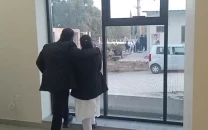Hafiz Saeed indicted in another terror-financing case
The case was filed by the Counter Terrorism Department in Gujranwala

Hafiz Saeed. PHOTO: REUTERS
Saeed pleaded not guilty to the fresh charges during the hearing in the Court No 1, conducted by Judge Arshad Hussain Bhutta. Defence lawyer Imran Gill said the second case was related to Saeed's charity operations.
Prosecutor Abdur Rauf Watto said that Saeed, who was indicted on similar charges in another case on Dec 11, ran militant charities and “collected illegal funds”. The court adjourned further hearing of the case until Saturday (today).
Earlier, top 13 leaders of the banned outfit, including its chief Hafiz Saeed and Naib Emir Abdul Rehman Makki, were booked in nearly two dozen cases for terror financing and money laundering under the Anti-Terrorism Act, 1997.
Terror financing case: ATC indicts JuD chief Hafiz Saeed
The Counter-Terrorism Department (CTD), which registered the cases in five cities of Punjab, declared that the JuD was financing terrorism from the massive funds collected through non-profit organisations and trusts including Al-Anfaal Trust, Dawatul Irshad Trust, Muaz Bin Jabal Trust, etc.
The organisations were banned in April as the CTD during detailed investigations found that they had links with the JuD and its top leadership, accused of financing terrorism by building huge assets/properties from the collected funds in Pakistan.
Finally, 23 FIRs were registered against JuD leaders at the CTD police stations of Lahore, Gujranwala, Multan, Faisalabad and Sargodha on July 1 and 2.
CTD arrests four of Hafiz Saeed's aides
Besides the top two JuD leaders, Malik Zafar Iqbal, Ameer Hamza, Mohammad Yahya Aziz, Mohammad Naeem, Mohsin Bilal, Abdul Raqeeb, Dr Ahmad Daud, Dr Muhammad Ayub, Abdullah Ubaid, Mohammad Ali and Abdul Ghaffar were also booked in the cases.
The CTD took some months to collect evidence against the banned organisations regarding terror financing and assets/properties which had already been seized by the state.
“These assets/non-profit organisations have already been taken over by the government in compliance with UN sanctions,” he added.



















COMMENTS
Comments are moderated and generally will be posted if they are on-topic and not abusive.
For more information, please see our Comments FAQ